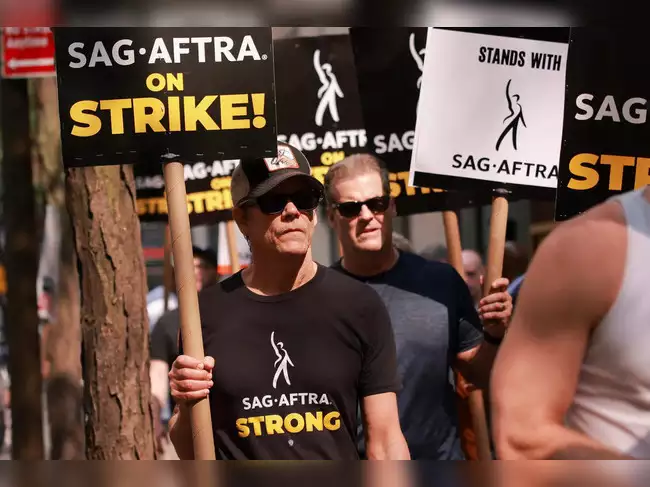
Will Ebeler is a student at Harvard Law School.
In this weekend’s news and commentary, dockworkers on the West Coast ratify new contract, SAG-AFTRA begins voting on whether to authorize strike against video game companies, Republican state attorneys general urge SEC to make Shein prove it doesn’t use forced labor, and news from across the country about tomorrow’s Labor Day.
On Thursday, the International Longshore and Warehouse Union announced that its members had voted to approve a new six-year contract with the Pacific Maritime Association. According to the union, the contract was approved by 75% of the members who voted. The deal will cover 22,000 dockworkers at 29 ports along the West Coast who had been working without a contract since July 2022. Neither party has released the details of the new contract.
SAG-AFTRA will vote starting this week on whether to authorize a strike against video game companies. The union is seeking wage increases and protections against the use of artificial intelligence for video game performers. Employer use of artificial intelligence has been an important issue in negotiations throughout the entertainment industry this year and has been a continued source of tension with movie and television studios, in addition to these negotiations with video game companies. In a statement, SAG-AFTRA president Fran Drescher said, “Once again, artificial intelligence is putting our members in jeopardy of reducing their opportunity to work.” Voting will close on September 25, and according to the union bargaining is scheduled to resume on September 26.
On August 24, the Republican attorneys general of 16 states sent a letter to Gary Gensler, the chair of the SEC, expressing concern over the business practices of Shein, a fast fashion retailer. Investors expect Shein to file for an initial public offering soon, and the attorneys general urged Chair Gensler to require Shein to prove it does not use forced labor before approving a filing. The letter was sent the same day Shein announced it was buying a stake in Forever 21’s parent company and that it might start selling its products at Forever 21 stores in the United States. As I discussed earlier this year, until now Shein has relied on a direct-to-consumer business model and has been under scrutiny from Congress for its suspected reliance on Uyghur forced labor. The lead author of the letter, Montana’s attorney general, has made headlines for his high-profile and controversial efforts to ban TikTok in Montana.
Finally, there is a variety of news from around the country in the leadup to Labor Day. This morning’s Washington Post has a column that the discusses the reasons for optimism about the future of the labor movement. As the column explains, recent pro-worker decisions by the NLRB “effectively makes union organizing possible again,” and a recent report by the Treasury Department shows that 61% of the public thinks “unions help rather than hurt the U.S. economy,” a record high. The Associated Press has an article explaining the origins of Labor Day. The first Labor Day was celebrated on September 5, 1882, when 10,000 workers in New York City marched in a parade organized by the Central Labor Union and the Knights of Labor. A few cities and states recognized Labor Day in the following years, but it wasn’t until 1894 that it was recognized as a federal holiday in both the U.S. and Canada. The holiday was recognized during a contentious year between labor and the U.S. government. The Pullman Railroad Strike, which began in May 1894 and shut down rail traffic in large parts of the country, was ended after the government sent in federal troops to suppress the strike, an intervention that left more than a dozen workers dead. Federal recognition of Labor Day in the aftermath of the Pullman Strike was an attempt “to repair the trust of workers.” According to historians, it was also an attempt to shift attention away from May Day, which in other countries had become linked with socialist and radical labor movements. This year’s Labor Day celebrations include a parade in Pullman, Illinois, the city where the 1894 Pullman Strike first started.






Daily News & Commentary
Start your day with our roundup of the latest labor developments. See all
January 29
Texas pauses H-1B hiring; NLRB General Counsel announces new procedures and priorities; Fourth Circuit rejects a teacher's challenge to pronoun policies.
January 28
Over 15,000 New York City nurses continue to strike with support from Mayor Mamdani; a judge grants a preliminary injunction that prevents DHS from ending family reunification parole programs for thousands of family members of U.S. citizens and green-card holders; and decisions in SDNY address whether employees may receive accommodations for telework due to potential exposure to COVID-19 when essential functions cannot be completed at home.
January 27
NYC's new delivery-app tipping law takes effect; 31,000 Kaiser Permanente nurses and healthcare workers go on strike; the NJ Appellate Division revives Atlantic City casino workers’ lawsuit challenging the state’s casino smoking exemption.
January 26
Unions mourn Alex Pretti, EEOC concentrates power, courts decide reach of EFAA.
January 25
Uber and Lyft face class actions against “women preference” matching, Virginia home healthcare workers push for a collective bargaining bill, and the NLRB launches a new intake protocol.
January 22
Hyundai’s labor union warns against the introduction of humanoid robots; Oregon and California trades unions take different paths to advocate for union jobs.